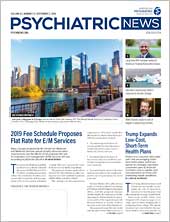The Centers for Medicare and Medicaid Services (CMS) has released the proposed 2019 Physician Fee Schedule, including proposals to reduce documentation burdens associated with evaluation and management (E/M) services and to substitute a single “flat rate” payment for some E/M services for Medicare patients. (For a summary of other proposed changes, click
here.
The proposed changes apply only to those E/M codes billed in an office setting for new and established patients (99202-99205 and 99212-99215).
The changes to documentation requirements, if finalized, would allow physicians to choose from three possible documentation methods:
•
Documenting on the basis of current guidelines (but physicians would only need to meet requirements for a level 2 service);
•
Documenting on the basis of face-to-face time only (CMS has not yet determined the exact minimum time required);
•
Documenting by medical decision making only (physicians would only need to meet requirements for a level 2 service).
Jeremey Musher, M.D., APA’s advisor to the Current Procedural Terminology (CPT) Panel and RVS Update Committee (RUC), said the proposed changes should simplify documentation for billing purposes. But he noted that physicians would still be required to provide documentation to clarify medical necessity or for other clinical purposes.
The proposed single flat rate would take the place of the different levels of complexity (2 through 5) currently reportable by clinicians. That means physicians would be paid the same rate in the outpatient setting for E/M services regardless of the complexity of the work a patient requires.
The effect of this single flat rate for E/M services will be highly variable, depending on the mix and complexity of patients seen in a physician’s practice.
“The administration has proposed significant changes to how E/M services are to be documented and paid,” Musher said. “Some of the proposed changes will be seen as welcome relief from onerous documentation burdens, but the associated flattening of the payment would adversely affect physicians who work with more complex patients and bill more of the high-level codes. APA is working collaboratively with other physician organizations and coalitions, including the American Medical Association, to understand the impact of what has been proposed and provide thoughtful recommendations to the administration. The common, consistent theme among the physician organizations has been to ensure that all patients have access to appropriate care and that physicians are paid appropriately for their work.”
According to an initial estimate by AMA, psychiatry would see a small increase in payment for E/M services if the proposed flat rate is made final. But certain subspecialists and physicians who treat more complex patients would likely see a decrease in overall payment. For example, payments to addiction medicine physicians and geriatric psychiatrists for E/M services are estimated to drop by 2 percent and 3 percent, respectively. Rates may or may not be offset by payments for other billed services or by the anticipated time savings associated with reduced documentation requirements, Musher said.
Some early responses to the proposed rule by APA members have emphasized the possible effect on access to care for the most seriously mentally ill. One member wrote in an email to APA staff, “It seems that the E/M service collapse will result in a financial incentive for psychiatrists to not see the more complicated patients. And despite very conscientious psychiatrists out there, this will be the result. I believe this is a disaster in the making, as it will likely result in more patients becoming destabilized and resulting in more psychiatric hospitalization, driving up costs.”
Additionally, CMS is proposing a number of new CPT codes, including a “shorter” prolonged service code that captures additional work beyond the typical E/M visit and a code that describes the technology-based, or “virtual” check-in for E/M services. The administration is also soliciting comments on whether and/or how to create an episode-based, bundled medication-assisted treatment (MAT) service. Creating such a bundle would “provide opportunities to better leverage services furnished with communication technology while expanding access to treatment for SUDs [substance use disorders],” according to CMS. ■
The proposed rule for the 2019 Medicare Fee Schedule can be accessed
here. APA members who need assistance with practice management issues may contact APA’s Helpline at
[email protected] or (800) 343-4671.
